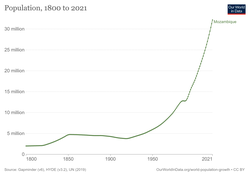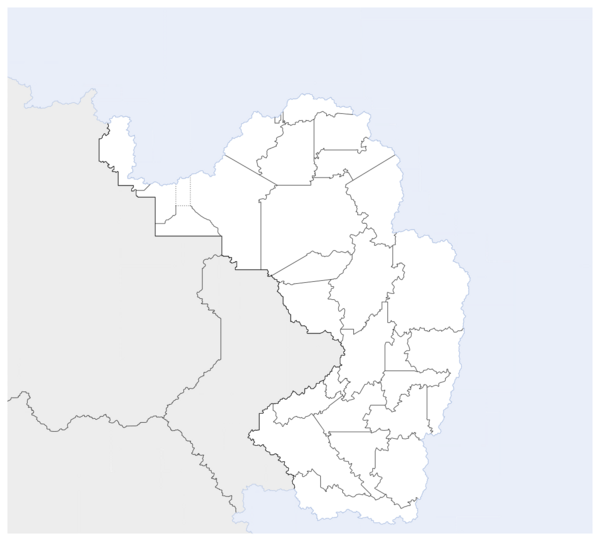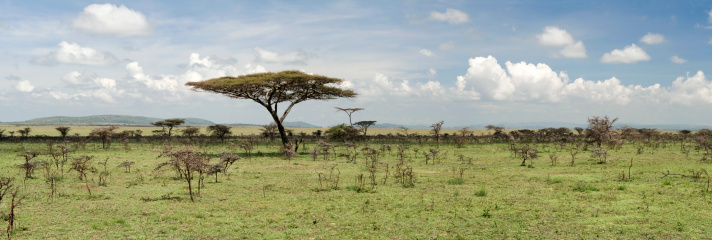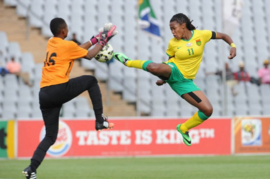Maucha
Democratic Republic of Maucha | |
|---|---|
Motto: "Für die Menschen aus dem Land des Silbers" (For the poeple from the land of silver) | |
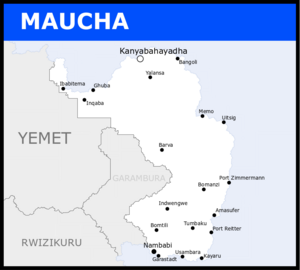 | |
| Capital | Kanyabahayadha |
| Largest | Nambabi |
| Official languages | Weranic Watuajua Sisulu |
| Recognised national languages | |
| Demonym(s) | Mauchian |
| Government | Federative presidential republic |
• President | Werner Okonkwo |
• Vice President | Mavo Holomisa |
• President of Senate | Kalere Odili |
• President of the Chamber | Issa Mbadinuju |
| Legislature | National Congress |
| Senate | |
| House of Deputies | |
| Formation | |
• Independence from Werania | 1950 |
• Join the United Bahian Republic | 1960 |
• Independence from the United Bahian Republic | 1964 |
| Area | |
• | 41,903,232 km2 (16,178,928 sq mi) |
| Population | |
• 2020 estimate | 30,955,202 |
| GDP (PPP) | 2020 estimate |
• Total | $100,542,496,096 (46th) |
• Per capita | $3,248 (56th) |
| GDP (nominal) | 2020 estimate |
• Total | $70,144,487,732 (53th) |
• Per capita | $2,266 (51st) |
| Gini (2020) | 42.4 medium |
| HDI (2020) | 0.601 medium |
| Currency | Mauchian Fedha (M₣) |
| Calling code | +255 |
| Internet TLD | .mw |
Maucha (Weranian: Mäusch, Watuajua: Mwisho, Sisulu: Mwisho), officially the Democratic Republic of Maucha (Weranian: Demokratische Republik Mäusch, Watuajua: Jamhuri ya Kidemokrasia ya Mwisho, Sisulu: Iriphabliki yaseMwisho Ekhululekile), is a sovereign state whose territory is in northeastern Coius. Maucha is the easternmost country in the western hemisphere, occupying a total area of 419,033 km² on the eastern coast of the subcontinent of Bahia. It borders Yemet and Garambura to the west. Maucha has territorial disputes over the Ibabochia region with Yemet and the Kulo State. Maucha is the third most populated country in Bahia with a population of 30,955,202 (as of January 2020). The capital of the country is Kanyabahayadha, located at the delta of the Fedha river on the northern coast of the country. The metropolitan region of Nambabi is the largest urban area of the country as well as the biggest city in Bahia.
EARLY HISTORY
After the breakaway from the United Bahian Republic, Maucha fell into a civil crisis, as minorities started to revolt against the ethnic government. The main insurgence happened in the Onikhuma provinces, as they claimed that the Government favored the Watuaji and gave them no representation. In 1967, a civil war started after Watuaji President, Asani Ibori, dissolved the National Congress, trying to shut any and all uprisings against his government. Ibori’s authoritarian government and the Civil War would last until 1978, when the Onikhuma movement, supported by other minorities, overthrew Ibori’s seat. The new republic was established in 1978 and sought to open Maucha to foreign investment and private capital, but in 1980, a coup saw a communist militia group taking over the government and creating a one-party system. In 1993, the Maucha Revolution took place, as the people fought against the corrupt and authoritarian government. Later in the same year, the Democratic Republic of Maucha was established, now under a new multi-party system that focused on democracy. The first public election in the country took place in 1995, with Onikhuma President Dominic Iondela being the first democratically elected president in Maucha’s history. From then on, Maucha is considered one of the fastest growing countries in Bahia
GENERAL ECONOMIC/SOCIAL INFO
Etymology
Linguists believe that the current name Maucha (Weranian: Mäusch) is a transliteration of the native Watuajua word "Mwisho", which means "the latter" or "the end". Linguists and historians believe that the term is correlated with the perception of Maucha's geographic position by the coast with the earlier Watuajuan people's perception of the limits of the land and the edge of the world; in theory, those people believed that their land was the last land before the ocean, meaning that it was at the edge of the land.
The current name was adopted officially in 1969 when Maucha achieved independence from the United Bahian Republic. Prior to that, the nation underwent the name of the Eastern Bahian Republic since its independence from Werania, in 1950. During colonial times, however, the country was named Silberküste, which literally translates to "Silver Coast", an allusion to the metal heavily commercialized by the Watuajuans before and during the colonization period.
History
Antiquity
Modern Kingdoms
The fall of the Chisomo Dynasty of the Kingdom of Sena in 1653 marked the establishment of the Njinji-Susulu Confederacy and its hegemony in the territories south of the Iwoye River. The Confederacy succeeded in expanding their territory north of modern-day Maucha but found resistance from the Onikhuma Kingdom, another well-settled local kingdom. From the beginning of the 18th century up to 1786, both the Onikhuma Kingdom and Njinji-Sisulu Confederacy fought a series of battles in what became known as the XXXX War. Ultimately, the Onikhuma Kingdom was subjugated by Mabuti I and became a part of the Confederacy. Despite the growing conflicts down in the Gonda Delta against the Gaullicans, the Confederacy kept on pushing their forces up to the Watuajuan coast.
By the end of the 18th century, the Watuajuan Confederation had become an extremely well-organized and well-developed State, with many international merchants arriving for their abundant silver. The Watuajuan Confederation dominated the delta of the Fedha River and extended its area to the northernmost part of modern-day’s Maucha’s panhandle. Such wealth and stability attracted Weranian missions, who looked forward to commercializing silver with the Watuajuan. In 1809, the Battle of Yalansa put the Njinji-Sisulu Confederacy on the edge after an easy victory from the Watuajuan forces. After a few years of backing off, the Njinji-Sisulu came back for a new attempt, this time succeeding and taking over the cities of Yalansa in 1829, and Bangoli in 1832, and exposing the Watuajuan capital city of Kanyabahayadha to the invaders. Noticing the clear disadvantage, the Watuajuan signed the Military Contract of 1835, which allowed the Weranian military to have jurisdiction over the Watuajuan land. This allowed Weranians to assist in the Watuajuan resistance against the Njinji-Sisulu and push back the invasion by reconquesting Bangoli in 1838 and Yalansa in 1840.
The Watuajuan Confederation kept on pushing the Njinji-Sisulu Confederacy back south, as they slowly took over their territory. By 1861, all former Kingdoms under the Njini-Sisulu north of the Iwoye River were freed and admitted into the Watuajuan Confederacy. In 1865, Nambabi was surrounded and sieged. The Sisulu Capital finally succumbed in 1869. The Watuajuan Confederacy, then renamed the Mwisho Empire, remained independent until 1876 when it became an official colony of Werania.
Geography
Climate
Biodiversity
Demographics
Largest cities in Maucha
2020 Census | |||||||||
|---|---|---|---|---|---|---|---|---|---|
| Rank | Maucha | Pop. | |||||||
 Nambabi  Garastadt |
1 | Nambabi | Kolisi | 10,947,827 |  Kanyabahayadha  Usambara | ||||
| 2 | Garastadt | Kolisi | 3,405,664 | ||||||
| 3 | Kanyabahayadha | Federal District | 2,756,782 | ||||||
| 4 | Usambara | Kolisi | 1,510,746 | ||||||
| 5 | Bomtili | Mabalane | 1,278,152 | ||||||
| 6 | Bangoli | Kikomakoma | 874,013 | ||||||
| 7 | Indwengwe | Indwengwe | 821,357 | ||||||
| 8 | Ibabitema | Ibabochia | 773,781 | ||||||
| 9 | Port Zimmermann | Onikuste | 583,776 | ||||||
| 10 | Amasufer | Madzi | 536,979 | ||||||
Ethnicities
Religion
Languages
Education
Government & Politics
Foreign relations
Military
Administrative Divisions
According to Mauchan Constitution of 1971, the federation is formed by 24 states, one [[Wikipedia:Autonomous administrative division |autonomous region]], one federal district, and one federal territory. The federal territory of Harara is the only administrative division that does not govern itself, as the federal government has total sovereignty over it. The Mauchan States have a great degree of freedom, though most of the judicial process is determined and enforced by the federal government. The Autonomous State of the Red Nation is the only administrative division in Maucha with higher judicial freedom. Currently, the State of Ibabochia is the only federal State undergoing the process of becoming an Autonomous State, but this issue has shown to be controversial as it depends directly on the outcomes in the Yemeti conflict. Nambabi and Garastadt together have applied for statehood in 2018 and the elevation of the megalopolis into a State is still under discussion in the National Congress.
The states are divided into 5 unoficial regions determined by merely geographical similarity. No government is responsible for the management of the regions and the functionality of it is for mere statistical purposes, as well as making it easy to share federal funds with the administrative divisions.
Each State is further down divided into municipalities that usually consists of one city as being the seat of the municipality. The municipalities are governed by mayors and unicameral legislatures which are all elected by the population every 4 years. There are a total of #### municipalities in Maucha. Similar to the 5 federal regions, the states are also further divided into meso-regions, which are formed by municipalities based on solely geographic similarities.
|
Sociopolitics
Economy
Tourism
Infrastucture
Health
Energy
Transportation
Media and communication
Culture
Music
Television and Cinema
Sports
Association football is the most played sport in Maucha, with the Mauchan top flight league being the most watched in Bahia. Internationally, the Mauchan men’s national football team is the one with the most IFF World Cup appearances in Bahia, having reached as far as the round of 16 during the 20XX edition, hosted at ?????. The women’s national football team has also never missed a World Cup, and they are also currently ranked the best in Bahia. The 2021 IFF women World Cup was hosted in Maucha, increasing the view of the sport thorough the country, and also opening space for more investments in the women’s modality.
Volleyball and Basketball come second and third, respectively, as the most watched sports in Maucha. Maucha usually ranks among the best in Bahia, and tend to be of good competition to other excelling Coian nations. However, Maucha excels in track & field sports, with gold medals being won in multiple modalities such as marathon, 100m, and others. Nceba Jezile is Maucha’s biggest gold medalist, having won 4 gold medals in 100m sprint modality.
E-sports is also a growing field in Maucha. The performance of Mtel Lion City in the 2021 Avatar World Cup in Dezevau brought the attention to the modality, and many sponsors saw the market as promising. Maucha is currently a powerhouse of Avatar in Coius, while other games are still in the process of receiving more attention. The current Mauchan Avatar Ace Division is set to add four new debutant teams for the upcoming 2022 season going from 10 to 14 teams.




